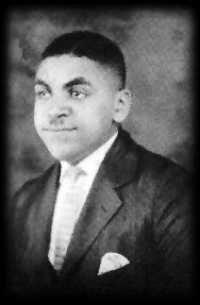Born in New York City, Fats Wller was the son of a churchman. He learned how to play the organ in church with his mother, Adeline Waller, who gave him a background in classical music. Fats' first musical experience was playing harmonium for his father's Abyssinian Baptist Church at 10 years of age. The music which Fats later picked up around Harlem was viewed by his father as "music from the Devil's workshop."
In 1918 he won a talent contest playing James P. Johnson's "Carolina Shout" which he learned from watching a pianola play the song. Later, when Johnson met Fats for the first time and heard him play the pipe organ, he told his wife, "I know I can teach that boy." So Johnson took Waller under his wing and within months had improved his play and introduced him to his first Harlem rent party. Waller was such a diligent and lonesome pupil that he would practice on the Johnson's piano until 3 or 4 o'clock in the morning--when Mrs. Johnson would finally order him to go home.
In 1922, Johnson had been asked to take over the piano at Leroy's, a club at Fifth Avenue and 135th Street where Willie the Lion Smith had been playing. But Johnson was going out of town with a show and he recommended his 18 year old protege for the job. This was Waller's night club debut. But he was ready because by this time, Fats had developed into an all-around keyboard dynamo who was playing theater organ for silent movies and stage shows (at Harlom's Lincoln Theater), accompanying singers, backing up dancers in chorus lines, vaudeville revues and nightclubs, and playing blistering stride piano at rent parties.
Johnson also took waller to QRS ("Quality Reigns Supreme") to make piano rolls. During the next five years, Waller turned out 19 rolls for QRS at one hundred dollars each. Along with the rolls made by Johnson, these performances have come to define the sound of what was first called "stride ragtime" but was soon identified simply as "stride piano." His keyboard style was as individual as a fingerprint, and his creativity was rampant at times. Waller's unique sound and approach to music helped to send his record sales soaring; however, impressive sales were due largely to his ability to be a clown, to be able to convert even the most inconsequential popular ballad into a thing of joy. The spirited personality of the man was so powerful that he was able to easily transmit it even through the narrow boundaries of a record groove.
Waller desired to give the audience what they wanted, a gradual shift from the staccato of New Orleans-style jazz towards the swing sound. This is apparent in the one vestige of Waller's association with Johnson. "If I Could Be With You," was composed by Johnson, and is played as a duet--a challenging duet by Waller and Johnson. In the opening verse, the two pianists are slicing through each other's phrases. But as they develop the choruses, one plays straight man, working the melody, while the other is a jaunty, decorative companion until the fianl chorus, when they syncopate into an easy swinging forecast of the jazz of the 30's and 40's.
In 1927, Waller co-wrote a couple of tunes with Johnson for his show "Keep Shufflin.'" Two years later, Waller wrote the score for the Broadway hit "Hot Chocolates" with lyrics supplied by his friend Andy Razaf. Together, Razaf and Waller formed one of the finest songwriting teams of the era. Numbers such as Ain't Misbehavin', Honeysuckle Rose, and (What Did I Do to be So) Black and Blue came out of this partnership which prospered until Waller's death.
Though his skills on the piano introduced him to fame, it wasn't until after Fats started to sing that he became famous. From 1930 to 1943, Fats made over five hundred recordings and he was recognized from the streets of Harlem to Danish nightclubs as he toured extensively and appeared on numerous radio broadcasts as well as in some Hollywood feature films. Fats unexpectedly died on board a train near Kansas City, Missouri of pneumonia on Dec 15, 1943. Usually remembered as a genial clown, he is of lasting importance as one of the greatest of all jazz pianists and as a gifted songwriter, whose work in both fields was rhythmically contagious.
Source: http://library.thinkquest.org/18602/history/classic/fwaller/fwaller.html
